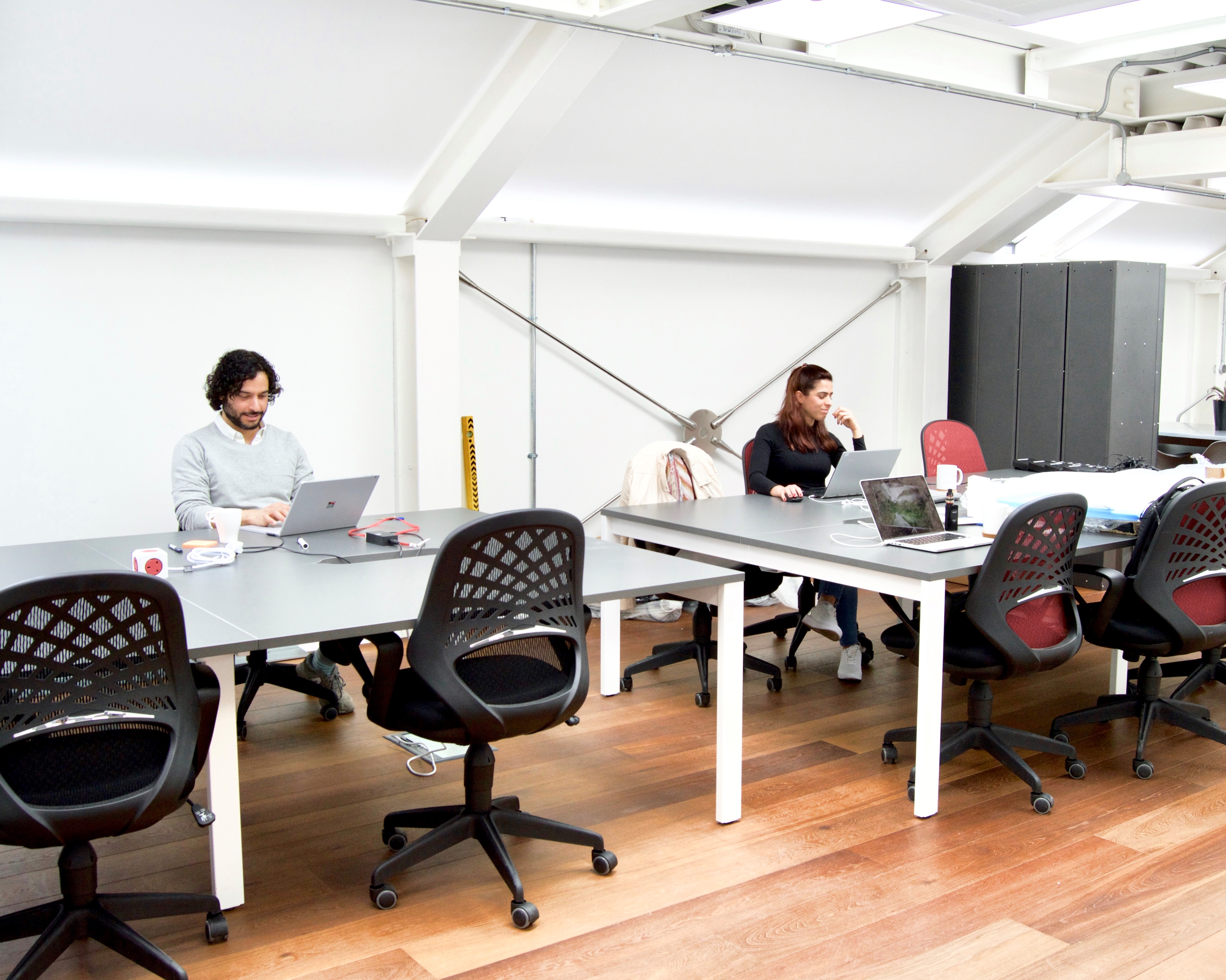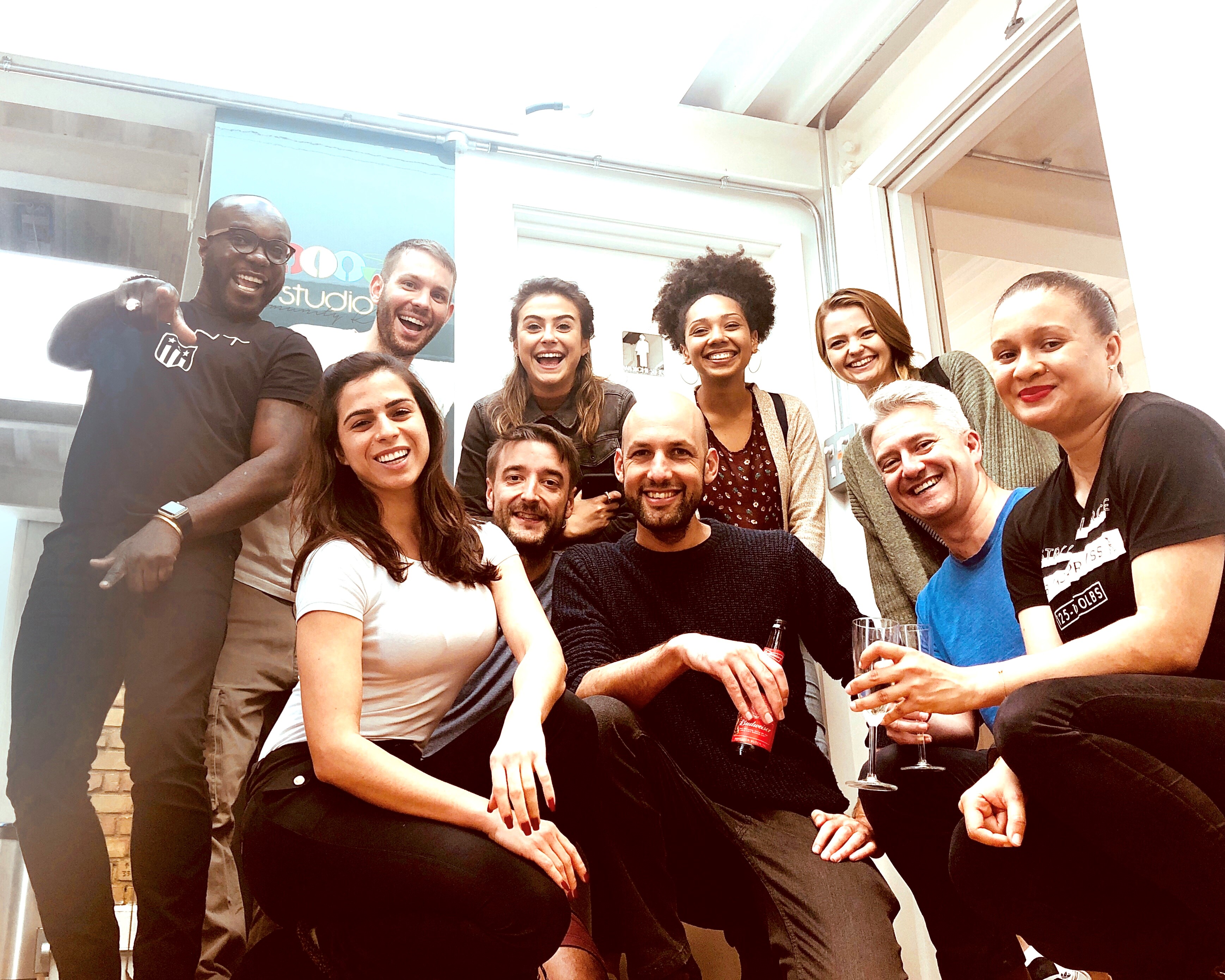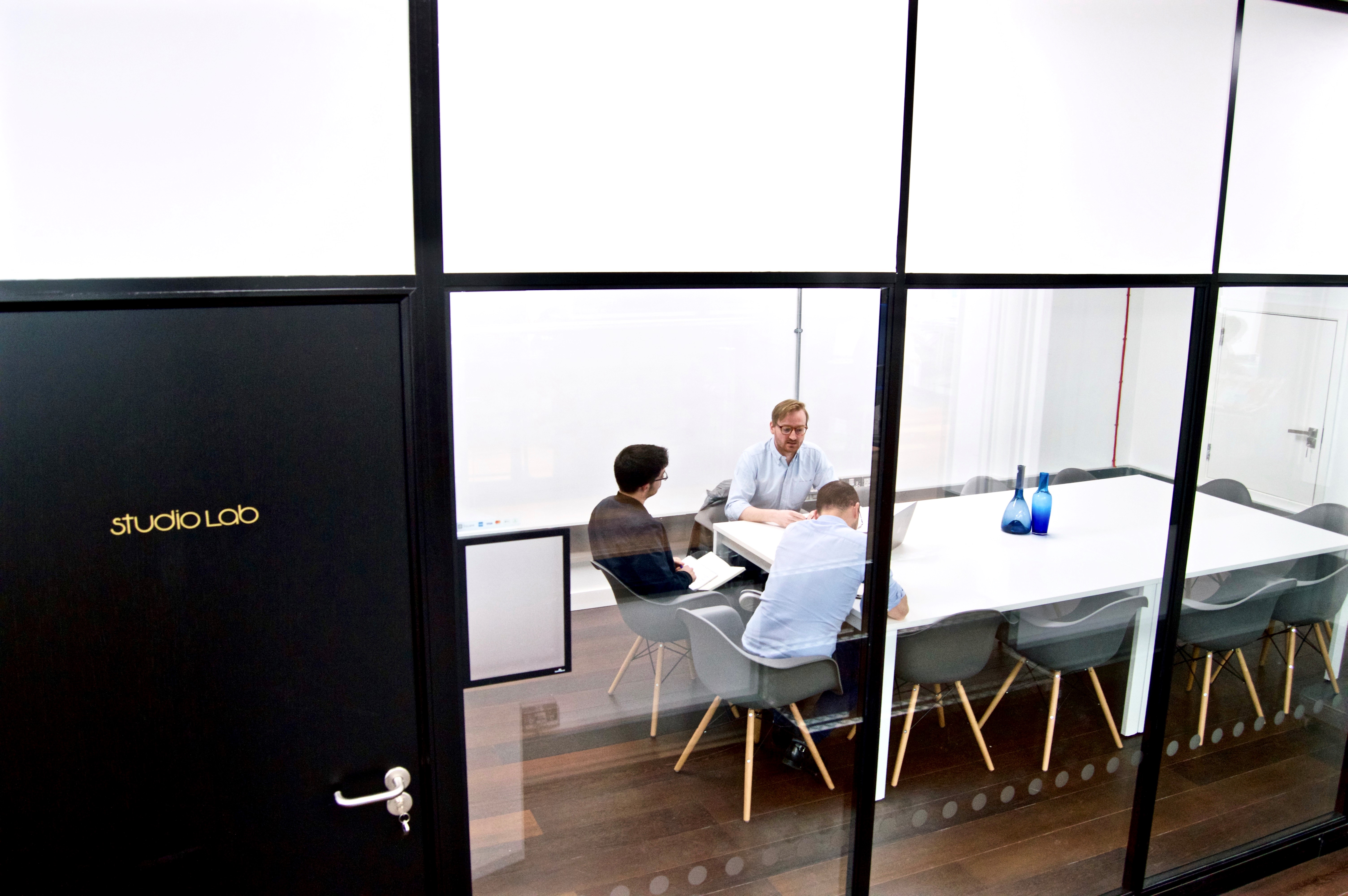"Coworking is about building a community that values innovation, cross-pollination and friendship"
Eric Asare is the Managing Director at The Studio and he is going to tell us a bit about this space and its community, and how he manages it!
The Studio, located between Camden Town and Kentish Town, is a hub for innovation and inspiration. It’s not just about hiring a desk space; it’s about building a creative community. We provide all the benefits of a professional office without the politics. The Studio is a place to work and a hub for meetups and community events. We’re not into stark corporate cubicles, so we’ve built The Studio in an industrial warehouse that oozes an entrepreneurial atmosphere!

What are you trying to achieve with the space you’ve created and the community you have at The Studio?
The Studio is exactly what it states, it’s a more sophisticated and corporate studio for professionals who share space, energy and ideas. We’re very passionate about enabling start-ups, SMEs and creatives to flourish and reach their potential. It’s amazing seeing people's productivity when they’re in the right environment!
With The Studio, we are building a closely knit community that believes in supporting each other, working together and we encourage building lasting friendships. There are no limits to collaboration and networking at The Studio and we encourage the mixing and matching of skills and ideas. Although we have a very productive and professional environment, it’s refreshing to feel the community spirit and be part of the daily laughs that are shared.
Community is very important to us, our in-house community as well as our external community, Camden. We engage ourselves with our Camden community by inviting them for events, and we support them via charitable engagements.
What would you do differently if you were to open your space today?
It’s a difficult question as The Studio is only 7-months old, but I believe I would have started the process of sourcing our IT infrastructure and ordered our internet supply much earlier. Failing to do this saw us delaying our opening by almost 3-months. It’s shocking how slow that process can go when Internet providers have to deal with the council as part of the process.
It would also have been a great idea to have creatively started with the engagement and creation of our community and secured some potential members in advance, as that would have seen us open up with a community rather than open the space and then build the community.
Could you share some tips to build and foster a strong community?
What’s worked well for The Studio is to fundamentally have a space that really works and provides the correct facilities to support the community to do what they came to do. Furthermore, I believe investing and having an experienced Community Manager who knows how to interact, create a buzz and is a natural people’s person is crucial. Also, I know our members appreciate being listened to, feeling that they have a voice and made to feel that their opinion matters - these really help with building loyalty. Getting the community involved in the sustainability of the space creates a mutually viable vision for the space.

What are some of the daily challenges you experience? How do you deal with them?
Challenges will always arise and it’s usually because of lack of preparation or planning, so good procedures are crucial. They are, of course, the thing you can’t plan for that really affects operations such as issues with IT, printers, or internet. These can cause a lot of stress as the community expects a solution immediately, while your suppliers are taking hours and sometimes days to solve.
There are also the ad-hoc issues where you have to deal with issues within the community, when some members don't see eye to eye. These issues are challenging as there needs to be diplomacy without taking sides but also finding a solution that is fair and resonates the spaces’ values and guidelines. We always stipulate what’s best for the community and our community guidelines. It’s important to deal with members in a respectable and non-judging way, while trying to reiterate community policies.
Before opening a coworking space, what are the main factors that should be considered?
I believe the most important questions need to be around the sustainability of the space and how this can be guaranteed. e.g. Is there a need for this specific space? Are there already others doing the same, and doing it well? Will you be able to gain enough members to sustain and where will those members come from? It’s also very important to question how you can make your space more valuable compared to existing spaces.
The perception of what a coworking space is, is changing very rapidly as a consequence of larger operators. Potential members tend to have many options on the type of community they can join and the added values they will gain from choosing a specific community. As one space can’t please all, it’s crucial to understand one should not have competition but rather work with other spaces, collaborate and support each other.
How do you see the London coworking scene? What makes The Studio different to others spaces in the city?
Coworking in London has grown rapidly and many of the new spaces are all about profitability and revenue. This has seen coworking become all about asset investment, marketing and PR strategies rather than what it actually is and should be about - coworking and community. I have certainly seen that the way people work has and is changing, and coworking spaces, or shall I say shared office spaces, will most probably become the way of working in the very near future.
The Studio is all about getting creatives together, setting a platform for creative collaborations and building a community that values innovation, cross-pollination and friendship. We are all about knowing each other, having an atmosphere that feels like hot-desking, with friends around a kitchen table, and making every day feel like another fun and exciting day. To aid our community and encourage this culture, we designed and built The Studio in perfect detail. This can be experienced and seen right through the whole space and is always appreciated and complemented by all our visitors.

What are you trying to achieve from the workshops and programmes? How do they benefit your community?
Our workshops always take synergy into account and support our members' personal and business growth. We also open our workshops and programmes for external guests, as it aids in networking.
We are currently planning and designing workshops and programmes that will nurture the same effect of an accelerator. Our members will be able to select and join various programmes that can strengthen and accelerate areas where they need to progress the most. We will invite impact makers within their sectors to come and hold workshops and business clinics, as a way to help all our members take the next step in their business and plan for expansion with confidence, support and encouragement.
How do you encourage members to get involved with these workshops and programmes?
Constant verbal communication with members is very important. We even have members who fulfil specific roles within our community, such as Community Catalyst. This is great as members always talk, brainstorm and share ideas about the space. The Community Catalyst always knows what’s going on within The Studio and is perceived as a source of information. We also encourage our members to suggest workshops or programmes, and collaborate with members who want to volunteer holding useful workshops for the community.
Thank you Eric! Check out our other interviews to learn more about how different coworking spaces and its communities are managed.
Related stories
Global Coworking Trends and Opportunities for 2025
Now well into 2025, the coworking industry continues to demonstrate strong momentum. With demand for coworking spaces remaining steady around the globe, it's clear that coworking is not just enduring—it's thriving. Let’s explore the major trends and opportunities shaping the global coworking landscape this year.
Creating Events that Drive Community Engagement in Coworking Spaces
Community is everything in coworking, but a genuine sense of connection between members doesn’t magically happen overnight or by chance. Often, meaningful relationships take intentionality, effort, and time to build, with events being an effective vehicle for bringing people together around shared interests, goals, and experiences, creating opportunities for collaboration, and a thriving coworking culture. This article looks at creating events that drive community engagement in coworking spaces.
Liz Elam: ‘Community is the number one amenity in coworking spaces’
A household name in the global coworking industry, Liz Elam, is the founder of one of the world’s best coworking event series: GCUC. Liz’s coworking roots began in 2010, when she established Link Coworking – a welcoming, affordable, and professional coworking space – in her hometown of Austin, Texas. Link Coworking achieved incredible success, expanding across three locations and becoming the fourth-largest coworking brand in Austin. It was sold in 2019, making Liz the first woman globally to exit a coworking brand.
Key Takeaways from the Coworking Alliance Summit 2025
Gathering online for the Coworking Alliance Summit last week, members of global coworking alliances, coworking spaces, and community leaders came together to navigate global issues, strengthen ties across the coworking industry, and work collectively towards future goals.
5 Ways to Reduce Noise in Open Offices & Coworking Spaces
Some people like working against a background of noise, while for others it’s their worst work nightmare. The truth is, our relationship with noise depends on our own preferences and the nature of our work.
ViDA Compliance Guide: 8 Essential Steps for Coworking Spaces in the EU
Now that 2025 has arrived, the European Union's VAT in the Digital Age (ViDA) initiative is becoming a key topic for coworking spaces operating in the EU. But don’t panic—ViDA will be introduced gradually, with key changes taking effect from 2028. This major VAT reform aims to modernize tax reporting, combat fraud, and streamline compliance through mandatory e-invoicing and real-time digital VAT reporting for certain transactions.
Key takeaways from the Workspace Design Show 2025
London’s Workspace Design Show is undoubtedly one of the best coworking events of 2025. For one, the exhibition (held at Islington’s Business Design Centre) features a host of innovative and creative workspace design solutions tailored to the needs of modern workplaces.
Harnessing AI to Help Coworking Operators Understand Their Communities Better
After more than twelve years in the coworking industry, we’ve seen the movement evolve at an incredible pace, especially in recent years. Spaces have grown larger, making it harder for operators to truly connect with their communities. At the same time, expectations for higher service standards and increasing competition mean that creating tailored experiences and fostering long-term member engagement is more important than ever.
What Is Workplace Management and Why Does It Matter?
There has always been a need for workplace management – the process of organising and optimising physical spaces, resources, and operations to support people’s needs. But, as 28% of UK working adults were reported to work in a hybrid capacity last autumn (by the Office for National Statistics), the question of ‘why workplace management matters’ is more critical than ever. Let’s look at the workplace management benefits for your operations.
10 Smart Goals for your Coworking Space: How to Set & Achieve Business Objectives
Coworking is synonymous with creativity, collaboration and productivity. Businesses and freelancers love coworking spaces because (by surrounding themselves with fellow workers) they’re more likely to achieve their goals. The coworking environment, while social, is set up to facilitate focused, distraction-free working.

